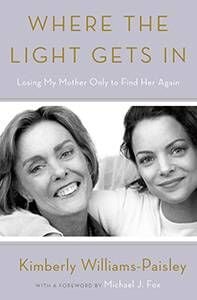Kimberly Williams-Paisley Chronicles Her Mother's Dementia
Her heartfelt memoir describes the fear, grief and joy of her family's journey
“It will be a good story someday,” became a catchphrase of actress Kimberly Williams-Paisley’s mother throughout their lives whenever something went wrong.
But on the actress' real-life wedding day to country music star Brad Paisley — a role for which she had a big screen dress rehearsal years before, starring alongside Steve Martin in the Father of the Bride movies — she realized something was wrong. And it wasn’t going to be a good story. At least not at first.
It was 2003 and her mom’s crying episode over not having a role in the wedding was followed by a last-minute inclusion of her to do a reading.
But Linda Williams mispronounced Colossians (it came out “Colithians”) and then experienced a very long forgetful pause. Something was not right. It was uncharacteristic of Williams-Paisley’s sharp mother to have a brain lapse. She had been a freelance foreign news correspondent in London and was currently working as a major donor fundraiser with The Michael J. Fox Foundation for Parkinson’s Research. She was only 60 at the time.
Sign of Things to Come
But as I talked to Williams-Paisley about her new book, Where the Light Gets In: Losing My Mother Only to Find Her Again, she explained that her wedding day was the red flag, the first glimpse of what was coming.
Williams-Paisley’s mother was diagnosed two years later at age 62 with a rare neurological syndrome called primary progressive aphasia (PPA). Speech and language are affected, while other brain functions remain unchanged. The degenerative disease progresses, with individuals unable to write or read or comprehend what they hear until finally they are no longer able to speak or effectively communicate. PPA can eventually lead to a more comprehensive degenerative brain disease such as Alzheimer’s or another type of dementia. About half of those with PPA have a parent or sibling with the condition, pointing to a genetic connection, according to researchers.
I told Williams-Paisley that reading the book (I devoured its 246 pages in two hours) was like having coffee with a girlfriend — the tone is so conversational and intimate. Some parts are humorous (courtesy of her country crooner husband Brad, who kept his wife’s spirits up and became her rock), while others are heartwrenching (her struggle with understanding life with "old Mom" versus "new Mom"). During our conversation, Williams-Paisley told me that as a new mother to her firstborn son, Huck, she sobbed thinking her son would never know his grandma as the person she had known.
A Long-Distance Caregiver
Her story takes the reader on a heartfelt family’s journey with dementia and how it affects not just the person with the disease but the entire family. Since Williams-Paisley was beginning her new life in Nashville with her husband, she became a long-distance member of the care team around her New York-based mother, with the primary caregiver being Williams-Paisley’s dad, Gurney.
“I experienced the guilt of living far away and I felt so helpless,” Williams-Paisley told me, lamenting that her dad and sister Ashley were on the front lines of caregiving. But, she adds, “Eventually I gave myself permission to let it go and focused on the things I could do.”

Williams-Paisley was definitely not taking the caregiving journey alone. In fact, this is an inspirational book about how a family can create a care team where everyone’s role is important. Instead of hurt feelings, frustration or anger among siblings over who was doing more, this was a family who came together through caregiving. It was an ensemble cast and everyone had a key role.
Williams-Paisley’s role became researcher. She scoured articles, clinical trials and other information about how to keep her mother safe at home and help her dad. She also became her dad’s cheerleader and supporter and called him daily to check in. As care costs escalated, she and husband Brad also helped out financially. Her brother Jay became a paramedic, so the medical information and explanations became his job. Her sister Ashley was there in New York as hands-on secondary caregiver supporting their father.
And ultimately, Williams-Paisley became the family chronicler. Although she wrote the book, it is actually the story of how each of her siblings and her dad were coping. The Williams family wish was to help other families, since theirs was so unprepared for such a devastating blow.
The Shame of Dementia
She does describe a concern that her parents initially wanted the diagnosis to stay within the safe walls of the immediate family. When Ashley reached out to a renowned dementia specialist on whether he might be able to help, her parents were furious that someone “outside the family” had been told.
The stigma of a brain disease or disorder is not uncommon for families of dementia. According to an Alzheimer’s Disease International report, 25 percent hide their diagnosis and 40 percent withdraw from everyday activities; two-thirds of dementia caregivers feel others perceive those with dementia in a negative way. But denial can block families from finding support and good information on how to manage the disease and care duties.
Williams-Paisley also told me her “aha” moment came when her parents arrived in Nashville for a visit and her dad asked her to take her mom to the ladies room. As she helped her mom into the stall, she saw her mother’s incontinence had become a huge issue — her pants were soaked. Williams-Paisley looked in the bag her dad had casually handed her and it contained an extra set of adult diapers and pants. It finally hit her what was happening in her dad’s life.
“I did not realize the drain that caregiving was taking on my dad,” explains Williams-Paisley. “It dawned on me he never said a word because he didn’t want me to worry and he was still protecting mom’s dignity.” It broke her heart to think her mom needed the same help with bathroom activities from her dad as her two young sons needed from her.
Not All Was Darkness
But Williams-Paisley did find the silver linings in her mom’s progressively difficult life.
“I watch with joy as my oldest son Huck (now age nine) has become a beacon of light for my mom,” she told me. “He is uninhibited with her and somehow even at his young age he is intuitive about what is going on with his Nana. Their relationship and the way they laugh together is a gift for me.”
The worst day for Williams-Paisley was when her dad and sister had to finally take her mom to live in a long-term care facility. Her father could no longer care for his wife at home — her mother had bitten him when he gave her medications. Williams-Paisley said she felt so empty as her sister described having to almost run out of the long-term care facility as the door locked behind them and they were told by staffers to not look back. Her mom had been told this was the plan, but Williams-Paisley later learned she still felt abandoned.
The silver lining came three weeks later when Williams-Paisley visited her mom in her new “home.” At the end of the visit, she asked her mother if she liked it and her mom responded, without hesitation, “I love it.”
Williams-Paisley says she knows most aging parents don’t want to move into long-term care, and in her family they had promised her mom that would never happen. However, she told me, “It became the best thing for everyone — my mom, my dad, my sister. I know she’s safe and Dad can get his life back because he was not going to be able to continue much longer.”
Talk About Your Wishes
She also told me she wishes our society knew more about death. Williams-Paisley read Atul Gawande’s book, On Being Mortal, and “it really helped me understand more about what we face.” Her mantra: to “turn fear into faith.”
She advises families to have the caregiving conversation and to know a loved one’s wishes. Williams-Paisley said her dad and siblings have talked about their end-of-life and long-term care wishes after what they have gone through with her mom.
“Even if it’s just simply stating or writing a letter to your loved ones that says, “I love you, I trust you, I absolve you of any guilt over difficult decisions,’ it’s such a gift to have that conversation,” she said.
For Williams-Paisley, what started as a horror film with her mom’s diagnosis became an uplifting family movie. She is grateful for what she has learned as a caregiver. One of the greatest gifts is how she learned to be “present” for loved ones, she said. She’s also learned to look for the hopeful, happy moments in life.
She came up with the title for the book when listening to the Leonard Cohen song, Anthem, with these lyrics: “There is a crack in everything; that’s how the light gets in.” Even in the depths of PPA, she says of her mom, “You are still my teacher.”

Sherri Snelling is a corporate gerontologist, speaker, and consultant in aging and caregiving. She is the author of “Me Time Monday – The Weekly Wellness Plan to Find Balance and Joy for a Busy Life” and host of the "Caregiving Club On Air" podcast. Read More

